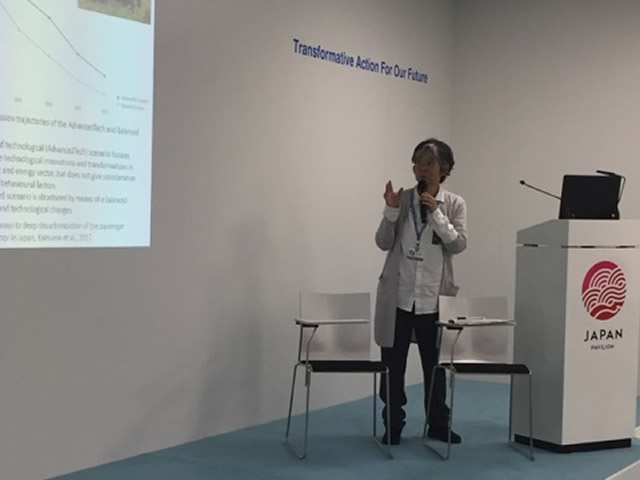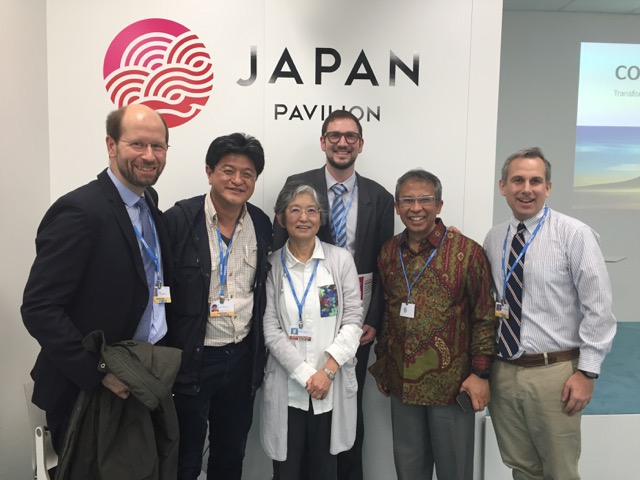
15:00 - 16:30
| Event title | Linkage between NDC and SDGs – synergies and trade-offs |
|---|---|
| Contents | To promote measures against global warming based on the Paris Agreement, and to ensure transition to decarbonised societies, it is important to link long-term targets/strategies with short- or mid-term concrete policy targets. As of August 2017, 155 “Nationally Determined Contributions (NDCs)” were submitted to UNFCCC (from 182 countries). In 2015, the 2030 Agenda for 17 Sustainable Development Goals (SDGs) was adopted. The global goal to combat climate change is one of the most crucial and urgent SDGs. This is because current actions will have a profound and everlasting influence on the future of the environment as well as the human race. Moreover, many actions aimed at tackling climate change will also help achieve other SDGs – such as ensuring access to affordable clean energy and building resilient infrastructure. This side-event aims to present 1) sectoral and concrete measures to tackle climate change under NDCs in each country; 2) prospects to achieve such measures; and 3) synergies and trade-offs between certain measures and SDGs. It also aims to share information contributing to attaining and improving NDCs in the future, and will call for further discussions. |
| Keywords | NDC, SDGs, Long-term Strategies |
| Speakers Name and Title |
|
| Organiser / Co-organiser |
|
Keynote presentation (20 min): Introduction on climate actions and interactions with SDGs
Presentation 1 (15 min): Clean Growth and Innovation in a Changing World
Presentation 2 (15 min): Developing Synergy between Climate Actions and SDGs in Development Planning Process
Panel discussion (40 min): How can we promote climate actions and interactions with SDGs?
This side-event was held to present 1) sectoral and concrete measures to tackle climate change under NDCs in each country; 2) prospects to achieve such measures; and 3) synergies and trade-offs between certain measures and SDGs. It also aimed to share information contributing to attaining and improving NDCs in the future, and will call for further discussions.
First, Dr. Mikiko Kainuma of IGES, introduced a new report entitled “Climate Actions and Interactions with SDGs”. The aim of this report is to provide a guideline to plan and implement the strategies for designing synergies and trade-offs between climate and sustainable development actions and between different sectors are also examined. In addition, some of the good low-carbon practices and policy implications are discussed in the sectoral domains. The report also points out that the NDCs of all countries combined still fall short of achieving the worldwide two-degree target, so increasing the level of ambition of the NDCs is therefore an urgent task. Dr. Kainuma mentioned that integration with SDGs might effectively enhance the ambition of NDCs, as well as promoting climate actions taken by stakeholders concerned.
Second, Dr. Stefan Lechtenböhmer of WI stated in his presentation that mitigation not only through resource efficiency and circular economy, but through emissions efficiency should be further promoted when considering strategies for deep decarbonisation of processing industries. Dr. Lechtenböhmer stressed the growing importance of integrating policies for climate, energy, innovation and resource efficiency with trade and growth policies. In addition, involvement of all societal stakeholders is indispensable.
Third, Prof. Rizaldi Boer, Bogor Agricultural University, referring to a case of forest management in Indonesia, explained how to generate synergies and how to syncronise between climate actions and development issues, as well as to smoothly promote them as integrated processes, even though sometimes governments in developing countries do not really look at climate change; rather they address development issues such as poverty alleviation and ending hunger. He mentioned that such an integrated approach could facilitate access to funding opportunities. In addition, Prof. Boer stated that science-based tools could be effective when promoting discussions with stakeholders concerned.
Dr. Yann Briand of IDDRI presented what has been learnt from the Deep Decarbonisation Pathways Project (DDPP), led by IDDRI together with research teams from 15 countries including Japan, US, UK, China, etc. He stated that demographic and economic development, population centres and distribution, spatial organisation of living spaces and lifestyles, infrastructure, mobility services, urban planning, etc. should be further considered, as “non-energy”and“non-technological” drivers of transformations.
Lastly, Dr. Eric Zusman of IGES presented that enhancing climate ambition requires making more links between NDC and air pollution/health. He introduced an integrated approach to air pollution and climate change in Bandung, Indonesia, as well as an ADB project that aims to give more attention to gender in mitigation actions. He stressed the importance of promoting co-benefits and multi-benefits together with climate actions.
Tomoko Ishikawa, Institute for Global Environmental Strategies (IGES)


Copyright Ministry of the Environment Government of Japan. All rights reserved